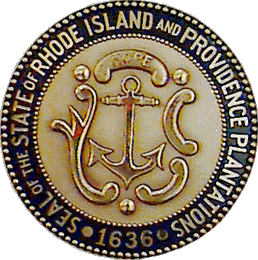Rhode Island May Change Name to ‘Rhode Island’
 The only non-Michael Jackson story atop Yahoo News‘ page is “Rhode Island closer to changing state name over slavery.” Not having previously heard Rhode Island was considering a name change — let alone over slavery — I was intrigued.
The only non-Michael Jackson story atop Yahoo News‘ page is “Rhode Island closer to changing state name over slavery.” Not having previously heard Rhode Island was considering a name change — let alone over slavery — I was intrigued.
After reading the story, much less so:
The country’s smallest state has the longest official name: “State of Rhode Island and Providence Plantations.”
A push to drop “Providence Plantations” from that name advanced farther than ever on Thursday when House lawmakers voted 70-3 to let residents decide whether their home should simply be called the “State of Rhode Island.” It’s an encouraging sign for those who believe the formal name conjures up images of slavery, while opponents argue it’s an unnecessary rewriting of history that ignores Rhode Island’s tradition of religious liberty and tolerance.
The bill permitting a statewide referendum on the issue next year now heads to the state Senate.
“It’s high time for us to recognize that slavery happened on plantations in Rhode Island and decide that we don’t want that chapter of our history to be a proud part of our name,” said Rep. Joseph Almeida, an African-American lawmaker who sponsored the bill.
Of course, said slavery happened in “Rhode Island,” too. And while I understand that “plantations” conjures up unpleasant imagery, it really doesn’t have anything to do with slavery in this context:
Rhode Island’s unwieldy name reflects its turbulent colonial history, a state that consisted of multiple and sometimes rival settlements populated by dissidents.
Banished from the Massachusetts Bay Colony for his unorthodox religious views, minister Roger Williams set out in 1636 and settled at the northern tip of Narragansett Bay, which he called Providence Plantations. Williams founded the first Baptist church in America and became famous for embracing the separation of church and state, a legal principle enshrined in the Bill of Rights a century later. Other settlers made their homes in modern-day Portsmouth and Newport on Aquidneck Island, then known as the Isle of Rhodes.
In 1663, English King Charles II granted a royal charter joining all the settlements into a single colony called “The Colony of Rhode Island and Providence Plantations.” The name stuck. Rhode Island used that royal charter as its governing document until 1843.
Opponents of the name charge argue that “plantations” was used at the time to describe any farming settlements, regardless of slavery.
Considering that I wasn’t even aware of the longer variant of Rhode Island’s name until reading the story, I’m not terribly concerned about this either way. But the long, unique name is an interesting quirk that naturally spawns questions about the state’s history. Why change that?






Rhode Island and the luxurious Newport area have a real historic relationship to slavery. The early Rum trade as sugar plantations in the Caribbean were run with slave labor and the molasses made was then sent to RI for distilling.
Why Newport and RI? Because that’s where many of the world’s largest sailing vessels we docked and the rum from slavery was sold to Africa, and London etc.to buy more slaves, again and again, expanding business and profit.
The real slave story seldom told is the pro-abolitionist northern state of Connecticut’s ivory trade and its connection with Tanganyika and Zanzibar, involving millions of lost lives – all after the Emancipation Proclamation was signed into law -all to support the industry of two towns -Ivoryton and Deep River which processed 90% of the world’s ivory.
A little known fact is that Connecticut had six black slave owners at one time and that New York City also wanted to secede from the union (all that money coming in from southern commodities)
Sorry just researched all this for a book I’m writing.
Let me guess. The guy offering the bill for the name change isn’t David Howard, by chance, is it?
This stuff gets more stupid by the hour.
As a Rhode Islander, this really annoys me. Providence Plantation was founded under the idea of freedom (religious mainly at first), not slavery. The fact that the word plantation is associated with slavery by some people, means we need to torpedo an historic name that has been around for almost 400 years? What the hell? Why are we so scared of words in this society?
They were for planting; this seems to be a very sad and restrictive view of a word used throughout New England without any relationship to slavery.
I will say though, that it bothers me that a number of beach resorts in the Caribbean and Gulf regions use the word plantation in their name. Since farming seems to have nothing to do with anything, the image formed is that here you will be served by people of color.
English settlements in Ireland around the same time were called “plantations” too, tho arguably there was some oppression going on in that case.
Since it’s Rhode Island, I think the change is silly.
I do however find myself bemused at ritzy Mississippi subdivisions with names like “Plantation Acres,” since in this context it seems about as suitable as “Gulag Orchards.” I always wonder what possesses the black residents to buy homes there. Haven’t had the nerve to ask however.
Another interesting renaming case occurred in King County, Washington, which was renamed as King County, Washington. It turns out that the county was originally named for William Rufus Devane King, a slaveowner. They subsequently renamed the county after some Baptist minister from Georgia or somewhere like that.
I’ve been to the Malbis Plantation in Alabama several times. It was founded after the Civil War by Greek farmers, so its use in a non-slavery context is present even in the Deep South.
Well, at least all the important issues in Rhode Island have been resolved if they have time to spend on this.
Why don’t we just number the states rather than giving them names? There’s something to offend practically everybody in the current names. Some are named after places in the United Kingdom so U. S. patriots might complain. Some are bad transcriptions of words in various North American Indian languages. Descendants of those people must be displeased with that. Some are derived from European languages other than English or named after historical figures that some object to or even after religious figures. Mustn’t have that.
Numbers.
Writing from State 21 (in order of admission).
Nah, let’s number them by population so that many of the names can change with each census. Think of hundreds of thousands of jobs that will save or create!
In a world run by idiot bureaucrats and a voting public that never really looks closely enough at anything being voted on, I believe this will change the name to “The State of Rhode Island And”.
Don’t look at me like that – you _know_ the bill as proposed probably works that way.
I look forward to much entertainment from the new RIA.
According to Wikipedia
“Roger Williams, a theologian who was one of the first to advocate freedom of religion, separation of church and state, abolition of slavery, and equal treatment to Native Americans, was forced out of Massachusetts Bay Colony. Seeking religious and political tolerance, he and others founded ‘Providence Plantations’ as a free proprietary colony. ”
Which just makes removing it for its slavery connotations that much funnier.
I read an interesting piece on the name change earlier today. I think some people are misinterpreting the word ‘plantation’ as it is used here.